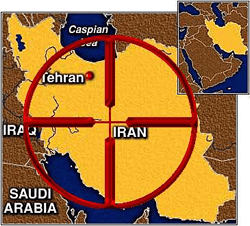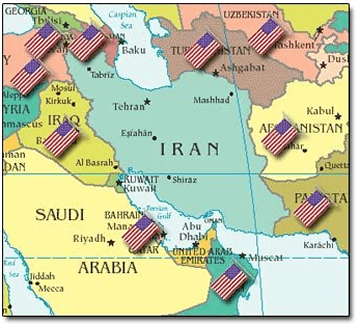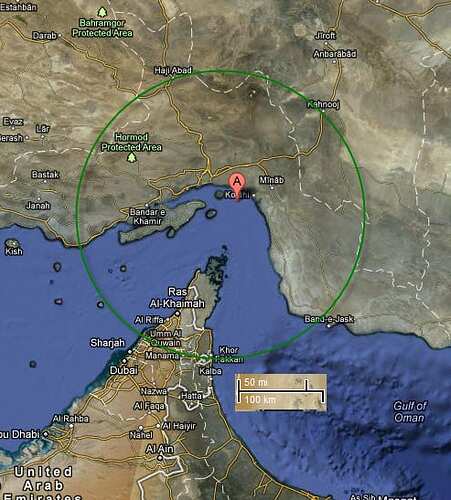 In each of the years 2008, 2009, and 2010, significant worries emerged that Western nations might attack Iran. Here again in 2012, similar concerns are once again at the surface.
In each of the years 2008, 2009, and 2010, significant worries emerged that Western nations might attack Iran. Here again in 2012, similar concerns are once again at the surface.
Why revisit this topic again? Simply because if actions against Iran trigger a shutdown of the Strait of Hormuz, through which 40% of the world's daily sea-borne oil passes, oil prices will spike, the world's teetering economy will slump, and the arrival of the next financial emergency will be hastened. Even if the strait remains open but Iran is blocked from being an oil exporter for a period of time, it bears mentioning that Iran is the third largest exporter of oil in the world after Saudi Arabia and Russia.
Once again, I am deeply confused as to the timing of the perception of an Iranian threat, right now at this critical moment of economic weakness. The very last thing the world economies need is a vastly increased price for oil, which is precisely what a war with Iran will deliver.
Let me back up. The US has already committed acts of war against Iran, though no formal declaration of war has yet been made. At least if Iran had violated US airspace with stealth drones and then signed into law the equivalent of the recent US bill that will freeze any and all financial institutions that deal with Iran out of US financial markets, we could be quite confident that these would be perceived as acts of war against the US by Iran.
And rightly so.
U.S. imposes sanctions on banks dealing with Iran
Dec 31, 2011
(Reuters) - President Barack Obama signed into law on Saturday a defense funding bill that imposes sanctions on financial institutions dealing with Iran's central bank, while allowing for exemptions to avoid upsetting energy markets.
The sanctions target both private and government-controlled banks - including central banks - and would take hold after a two- to six-month warning period, depending on the transactions, a senior Obama administration official said.
Sanctioned institutions would be frozen out of U.S. financial markets.
(Source)
The impact of this law was quite pronounced and immediate, with the Iranian rial falling sharply against the dollar in the first few days after the bill was signed into law.
Iran's rial falls to record low on U.S. sanctions
Jan 3, 2012
Jan 3 (Reuters) - The Iranian rial fell to a record low against the dollar on Tuesday following U.S. President Barack Obama signing a bill on imposing fresh sanctions against the country's central bank.
The new U.S. sanctions, if fully implemented, could hamper the world's major oil producer's ability to sell oil on international markets.
The exchange rate hovered at 17,200 rials to the dollar, marking a record low. The currency was trading at about 10,500 rials to the U.S. dollar last month.
Some exchange offices in Tehran, when contacted by Reuters, said there was no trading taking place until further notice.
"The rate is changing every second ... we are not taking in any rials to change to dollar or any other foreign currency" said Hamid Bakhshi in central Tehran.
(Source)
That represents a more than 63% decline in just a month. Assuming that Iran trades its oil in dollars, this will not necessarily cripple its economy, but the specter of hyperinflation looms large whenever a currency falls by that much. With hyperinflation comes economic, social, and political instability, and these are, of course, precisely the aims of the US in imposing the sanctions. And of course, everything that Iran imports will become hideously expensive -- quite rapidly.
The US is deliberately poking and prodding Iran right now. Given the glacial pace of nuclear development, we must ask ourselves, why now?
The Story
As with most things today, there is a story created for public consumption that justifies waging war against Iran. The main narrative goes something like this: Iran is trying to develop nuclear weapons, and this is intolerable, so it must be stopped.
In November 2011, the International Atomic Energy Agency (IAEA) issued a report, long denied under the prior director's tenure (Mohamed ElBaradei), finally declaring that Iran was unequivocally trying to build a nuclear weapon:
U.N. Agency Says Iran Data Points to A-Bomb Work
November 8, 2011
United Nations weapons inspectors have amassed a trove of new evidence that they say makes a “credible” case that “Iran has carried out activities relevant to the development of a nuclear device,” and that the project may still be under way.
The long-awaited report, released by the International Atomic Energy Agency on Tuesday, represents the strongest judgment the agency has issued in its decade-long struggle to pierce the secrecy surrounding the Iranian program. The findings, drawn from evidence of far greater scope and depth than the agency has previously made public, have already rekindled a debate among the Western allies and Israel about whether increased diplomatic pressure, sanctions, sabotage or military action could stop Iran’s program.
(Source)
I've not yet read the report, but I am concerned about the gap between the headlines I've seen that say Iran is building a nuclear bomb and carrying out "activities relevant to the development of a nuclear device." For example, much has been recently made of the fact that Iran has enriched some uranium to the 20% grade, but there is a huge leap between that and the 90%+ grade needed for a nuclear device. Iran had told the world it needed the 20% grade for a medical reactor, and then created a fuel rod for that reactor. To say that enriching to the 20% grade is the same thing as trying to build a bomb is not accurate and possibly deceptive.
As a signatory to the Non-Proliferation of Nuclear Weapons (NPT) treaty, Iran has every legal right to enrich uranium for peaceful purposes, such as making nuclear fuel rods for a research reactor, and Iran is claiming that all their current work is towards this end.
Maybe it is; maybe not. But even if a nuclear bomb is being pursued, there's nothing in the NPT that provides for military action to pre-emptively prevent any nation-state from carrying out such development work. In fact, if a preemptive strike is carried out, it will be done without the benefit of any international laws or treaties that could justify the action.
Also left out of the narrative is any explanation of why it was okay for Pakistan to develop nuclear weapons or why North Korea is permitted to hold them.
The simple answer is because they don't have any oil. A quick view of the US military presence surrounding Iran, coupled with the Iraqi experience of being attacked for supposed weapons of mass destruction that did not exist (nor were used by Iraq to threaten the US), reveals why Iran may be so motivated to develop a nuclear weapon:

If Iraq had a nuclear weapon in 2002, it is quite doubtful the US would have invaded -- a lesson that has not gone unnoticed.
While I am not a supporter of the current repressive theocratic regime in Iran, I strongly believe that it is up to the people of any nation to decide for themselves what sort of system they will choose to live under. The Arab Spring, as messy as it was, is vastly preferable to the blunt instrument of an externally driven war.
The Curiosity
The most curious thing about this story is the apparent lack of awareness among US officials about how the oil markets work. I know they know better, but the context-free repetitions in articles such as this next one almost literally drive me crazy:
Geithner to Seek China’s Support on Iran
Jan 9, 2012
U.S. Treasury Secretary Timothy F. Geithner will urge Asia's two biggest economies to cut Iranian oil imports and seek to narrow differences with China on trade and currency disputes on a visit to Beijing and Tokyo this week.
(Source)
The idea that the world can just stop buying Iranian oil, as though it were the same thing as boycotting McDonald's and buying Burger King instead, is just ridiculous. The world oil markets are far too tight for that.
How is it that China is supposed to cut its Iranian oil imports, exactly? Oil is a fungible product. If China cuts its oil imports from Iran, it will simply have to buy the missing amount of oil from someplace else. The 2.6 million barrels a day that Iran exports cannot simply be instantly replaced at this time from other spare capacity elsewhere in the world. It doesn't exist at the moment. Where will it come from?
Perhaps Geithner is offering something behind the scenes, like providing China with extra petroleum from the US strategic reserve while events unfold (unlikely). But barring that, it is a remarkably naïve request as it stands and is curious on its own.
The Powder Keg
With the Persian Gulf being so small, and so many tense parties crammed into that tiny arena, the chance of some sort of mischief arising is quite high. One twitchy trigger finger -- such as the one that caused the USS Vincennes, thinking it was under attack by a jet fighter in 1988 during the Iran-Iraq war, to shoot down an Iranian passenger airliner -- and the hounds of war may be let loose.
And it's not just the US. Practically everybody who's anybody has naval assets positioned for whatever may happen next:
Western forces react to Iran's Strait of Hormuz threat
Jan 9, 2012
TEHRAN, Jan. 9 (UPI) -- A buildup of Western naval forces in the Persian Gulf and Arabian Sea is a reaction to Iran's threat to close the Strait of Hormuz, military experts say.
U.S., Russian, French and British air and naval forces moved to the Syrian and Iranian coasts during the weekend, Israeli military intelligence Web site DEBKAfile reported Monday.
The Russian carrier Admiral Kuznetsov anchored earlier than planned at Syria's Tartus port on the Mediterranean Sunday, causing France to respond by consigning an air defense destroyer to the waters off Tartus, DEBKAfile reported. Canada also was sending a warship, the HMCS Charlottetown, to the Mediterranean where it would take over from the HMCS Vancouver.
Meanwhile, Britain has dispatched a missile destroyer to the Sea of Oman, due to arrive at the same time as the French Charles de Gaulle aircraft carrier.
And the U.S aircraft carrier John C. Stennis and its strike group are cruising in the Sea of Oman at the entrance to the Strait of Hormuz after Tehran announced it would not be allowed to cross through.
(Source)
With all those boats chugging around in those little bathtubs, and with various other forces that would definitely like to see a shooting war develop (a false flag attack is an option here), the risk is quite high of some form of incident that would trigger hostilities.
Of course, there are those in the war rooms of the various OECD countries who think they have a plan for the conduct of that war, but no plan ever survives first contact with the enemy. The one thing we can count on is the war being messier, longer, and more expensive by at least a factor of two than whatever is currently occupying the minds of the war planners.
Iran's Responses
Of course, Iran has been none too happy over the years at being surrounded, poked, prodded, and now finally sanctioned for having done nothing more than cloak its nuclear program in the exact same sort of secrecy that has surrounded literally every other nation's nuclear programs, including Israel and Pakistan, Iran's notable nuclear neighbors.
And now, with the aid of enhanced missile technology obtained from China and Russia, Iran has a credible threat to make:
Iran Has Ability to Block Strait of Hormuz, U.S. General Dempsey Tells CBS
Jan 9, 2012
Iran has the ability to block the Strait of Hormuz “for a period of time,” and the U.S. would take action to reopen it, Joint Chiefs of Staff chairman General Martin Dempsey said.
“They’ve invested in capabilities that could, in fact, for a period of time block the Strait of Hormuz,” Dempsey said in an interview aired yesterday on the CBS “Face the Nation” program. “We’ve invested in capabilities to ensure that if that happens, we can defeat that.”
Should Iran try to close Hormuz, the U.S. “would take action and reopen” the waterway, said Dempsey, President Barack Obama’s top military adviser.
(Source)
The admission here by the US military is that Iran has the ability to block the Strait of Hormuz "for a period of time," which they do, is an extraordinary admission (even if it really is stating the obvious) by the US brass.
Anti-ship missile technology has come a long way, and an offensive missile is much cheaper than either a large ship or defensive measures. The Falklands war in the early 1980s taught me that the navy is an outmoded concept if the opponent is armed with semi-decent anti-ship missiles, and such devices have improved remarkably since then.
During the most recent Iranian war exercises, the Iranian military test-fired (more of a demonstration, really) their Qader anti-ship cruise missile, which has a range of 200 km and can be fired from a small truck. To visualize the difficulty of defending against such a technology, just imagine how many hiding places for a small truck might exist within this 200 km radius green circle :
In order to neutralize the entire missile, full air superiority would have to be established and every mobile launcher found and destroyed.
Further, Iran has a number of submarines capable of firing a new breed of torpedo that can achieve speeds in excess of 200 knots. As far as I know, these are extraordinarily difficult to defend against, let alone evade.
Of course, China is paying close attention to the developments:
Iranian authorities reiterate threats to close Hormuz Strait if sanctions imposed on oil exports
Jan 8, 2012
TEHRAN, Jan. 8 (Xinhua) -- Iranian authorities reiterated threats to close Strait of Hormuz if Western countries impose sanctions on Iran's oil exports, local media reported Sunday.
(Source)
Conclusion
Once again, regrettably and mysteriously, we find the developed world in lock-step in its eagerness to attack Iran. "Regrettably," because Iran has not threatened any other country, and war should never be used simply because the current art of diplomacy is inadequate. "Mysteriously," because this is a particularly horrible economic moment to go about risking much higher oil prices.
While we judge the risks of a war, either precipitated by legitimate escalation of frictions or by illegitimate actors seeking to cause the same, to be very high, it is our view that such a war will not go according to plan. Iran has many more powerful allies, namely Russia and China, than did the extraordinarily isolated Iraq at the beginning of the Iraq war.
Is it too waggish to suspect that certain Western political powers would love to be able to both divert attention from the crumbling economy and have a scapegoat upon which to blame the next leg of the financial downturn?
Regardless of such speculation, the risk to each of us and the economy in general from an attack on Iran that closes the Strait of Hormuz is large enough to warrant your attention. Should oil spike in price, you can practically set an egg timer for the beginning of the next leg of the financial downturn.
In Part II: Are You Prepared for $200 Oil?, we explore what likely havoc the high oil prices from a major conflict with Iran will wreak on the financial markets and our petroleum-dependent lifestyle. We also detail specific steps prudent individuals should be taking right now, in advance of such a crisis, to position themselves defensively.
Click here to access Part II of this report (free executive summary, enrollment required for full access).
This is a companion discussion topic for the original entry at https://peakprosperity.com/iran-oh-no-not-again-2/
